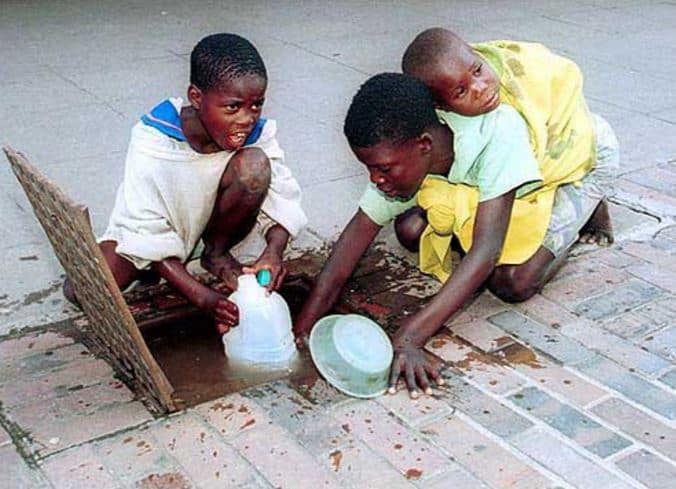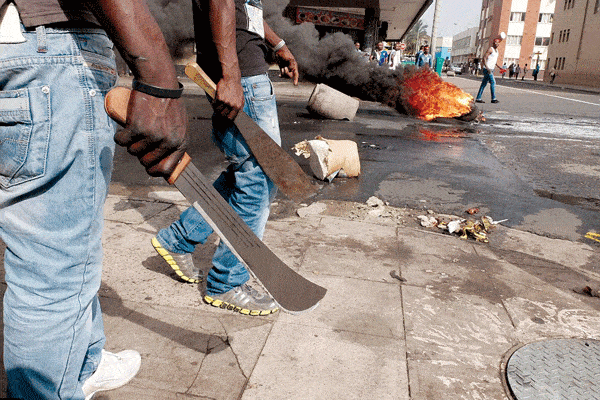Zimbabwe’s capital now resembles a deserted place, it is like a ghost town that only comes to life at night time, for many Zimbabweans, the national lockdown has pushed them to adjust their normal lives, however not much has been written home regarding street children.
Life is so difficult for them, there is a lot more than what meets the eye, some reports alleged they were taken to some farms near Harare, but others have relocated to where the action is.
Mukuvisi river banks has since become the new home for street children and Mbare Musika is now their new hunting ground.
When President Emmerson Mnangagwa eased the restriction measures, he made sure that the agricultural produce market is reopened.
Zimbabwe had to reopen the fresh produce markets after pressure from farmers who struggled to sell their harvest under restrictions aimed at stemming spread of the novel coronavirus.
Meanwhile, the COVID-19 pandemic has demonstrated an unprecedented need for safety for street children. In the face of lockdowns and curfews, street children around the world are struggling to get food, some are being rounded up into crowded detention centres, losing access to shelters or only able to access ones that are becoming overcrowded and unsafe.
News reporters this morning visited the Mukuvisi River banks to have a feel of how the street children are adjusting to the new normal and what this news crew experienced resembled a war zone.
On arrival, some of the street children were hesitant to open up, others were afraid of being arrested for not observing the lockdown measures such as social distancing and putting on masks.
“I don’t want to talk to you, because I know your mission is to arrest us for not using masks. Go and tell your (Mnangagwa) who has send you here to arrest us, that he should provide the masks for us and see if we will not comply,” shouted one street kid, adding that he was aware that those who defy lockdown regulations are being arrested.
However, upon identifying ourselves, some started opening up.
“This lockdown thing is very bad, the city centre, our normal hunting ground is desert, there is not food anymore. Life is no longer the same for us,” said another who only identified himself as Panashe.
“For now, we are surving on the rotten agricultural produce, like tomatoes, vegetables, and any other food stuff that could have been thrown away from Mbare Musika. We do not know if we were going to survive had it not been for the market produce,” he added.
Muchaneta Chipowe, a street parent said the national lockdown has made their lives miserable than before.
“When the city centre was open, there was a lot of food for us, we could get enough for the day by visiting fast foods outlets, supermarket and scavenge from what they would have thrown away.
“Some good Samaritans could also chip in with donations, but as it stands it is too hard for us,” she added.
Meanwhile, social commentator, Benhilda Gapare says in as much as the lockdown has affected everyone, life is so hard for the street children as all their source of livelihood is closed.
“According to studies, street children are more likely to live in large cities, often begging, collecting rubbish for recycling, scavenging rubbish dumps, shining shoes, selling flowers, magazines and newspapers, however, with the current situation there little room for them to find food,” she says.
She urged members of the public to help where possible.
“Street children are not just numbers or faces on the streets. They are part of our society, living human beings who are deprived of a playful childhood, care, love and compassion. These people deserve respect to be loved and to be helped as well,” she adds.
She adds that with or without lockdowns, street people deserve to be treated well.
“If we want street children to become productive members of our communities, they need to be provided identity, shelter, education and health care, skills and employment opportunities,” she says.
Apparently, April 12 passed quietly just like any normal day as the coronavirus pandemic casted a shadow on the day.
The day, however, was the International Day for Street Children. Ever since it was launched by the Consortium for Street Children (CSC) in 2011, the day reminds the world of the plight of street children around the world.
It comes and goes every year, without significantly changing the lives of tens of millions of children for whom streets have become home, exploitation has become routine and extreme poverty the reality of life. With the lockdowns in place, life has just turned another bad corner for them.
There is no reliable estimate of the number of street children around the world. According to a report by the UN International Children’s Fund (UNICEF), the number may be tens of millions.
UNESCO estimates the number to be 150 million, mostly in middle- and lower-middle income countries in Africa, Asia and South America. Since the UNICEF report was published in 2006, the number of street children has surely increased due to increasing population as well as rising urbanization.
International Day for Street Children has been celebrated globally since 2011, to recognise the humanity, dignity and defiance of street children in the face of unimaginable hardships.
According to the Consortium for Street Children, a lot need to be done to better the lives of street children.
“We want to rally governments and individuals worldwide to work together to ensure their rights are protected no matter who they are and where they live, even more so in the COVID-19 pandemic,” says the Consortium.














